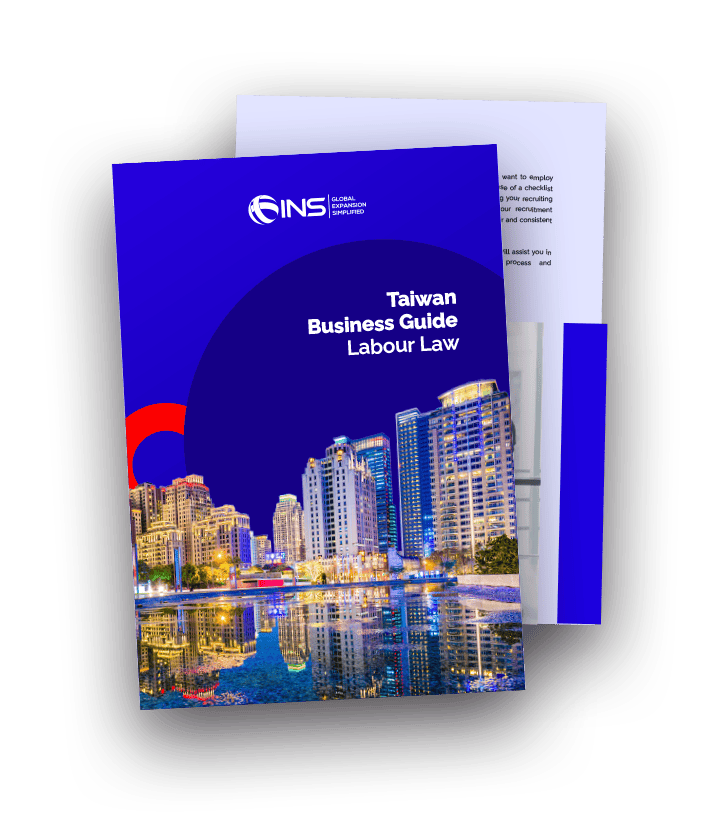How to Terminate an Employee in Taiwan
Termination of employment occurs when an employee’s period of employment, with a specific employer, comes to an end. The termination can be voluntary or involuntary and involves a formal notice to conclude the relationship.
In Taiwan the Labor Standards Act (LSA) regulates the relationship between employers and employees. The LSA is Taiwan’s primary source of employment law, as such it gives both parties rights and provides guidelines on how the parties are to conduct themselves in the employment relationship. The act also defines under which circumstances a termination would be substantively and procedurally fair.

Tired of scrolling? Download a PDF version for easier offline reading and sharing with coworkers
In a hurry? Save this article as a PDF
Tired of scrolling? Download a PDF version for easier offline reading and sharing with coworkers.
Fill up the form below 👇🏼
Circumstances Under Which an Employer Can Terminate an Employee
Article 11 of the LSA provides the circumstances under which an employer is able to terminate an employee:
- Where an employer’s business has been transferred or has been suspended.
- Where operating loses or business contractions have been suffered by the employer.
- Where the suspension of business has been necessitated by force majeure[i] and the suspension has exceeded 1 month.
- Where a reduction of the work force is necessitated by a change in the nature of business, and it is not possible to reassign the terminated employees to any other suitable positions.
- Where a particular employee is unable to perform the duties required of the position in a satisfactory manner.
Circumstances Where an Employer Can Terminate an Employee Without Advanced Notice
Article 12 of the LSA provides the circumstances under which an employer is able to terminate an employee, without giving the employee advanced notice:
- Misrepresentation – when an employee misrepresented any facts at the time he or she signed the employment contract which had mislead the employer, and as a result the employer sustained damage.
- Violent acts/gross insults – where an employee has committed a violent act or has grossly insulted the employer, his or her family members, a fellow employee or an agent of the employer.
- Imprisonment – where an employee has been sentenced to imprisonment (temporary or long term) in a final judgement and is not given a suspended sentence or he/she is not permitted to forego the sentence through payment of a fine.
- Breach of contract – where an employee is in serious breach of an employment contract or has seriously violated work rules.
- Damages – where an employee has abused or caused deliberate damage to any products, tools, machinery raw materials or property of the employer; or the employee deliberately discloses confidential or technical information which may cause damage to the employer.
- Absenteeism – where an employee has been absent from work for 3 consecutive days or a total of 6 days in a month, without good cause.
If an employer wishes to terminate an employee in accordance with any of the reasons listed above, the employer must do so within a period of 30 days of becoming aware of the particular situation.
**Note: the above clause does not apply to iii – Imprisonment
If an employment contract is terminated under these circumstances, an employee is not entitled to claim severance pay or additional wages.
Check Our Taiwan Labor Law Guide
Learn how the Taiwanese law is applied in all aspects and situations, from an employer and employee perspective

Circumstances Where an Employee Can Terminate an Employment Contract Without Giving Advanced Notice to an Employer
Article 14 of the LSA outlines the circumstances where an employee is eligible to terminate an employment contract without giving an employer notice:
- Misrepresentation – when an employer has misrepresented any fact at the time the employment contract was signed, which had misled the employee, and caused him/her to sustain damage.
**Note: Employee must act within 30 days of becoming aware of the situation
- Violent acts/gross insults – where an employer, a family member or an agent (of the employer) commits an act of violence against or grossly insults an employee.
- Injury – where the work detailed in the employment contract is likely to cause physical injury to the employee, and that employee has previously raised concern to the employer, but no action has been taken.
- Risk of Contagious disease – where an employer or another co-worker has contracted a contagious disease that may put others in the workplace at risk.
- Failure of payment – where an employer fails to pay an employee in accordance with the employment contract or; where an employer does not provide adequate work to an employee who is paid on a piecework basis.
- Breach of contract – where an employer breaches an employment contract or violates any labor relation, which may affect the rights and interests of an employee.
Employees on Leave or Receiving Medical Treatment
In terms of Article 13 of the LSA, an employer is NOT able to terminate a labor contract with an employee who is on leave or; an employee who is receiving medical treatment. The only exception is if business operations are unable to continue due to an act of God, force majeure or another catastrophe and the employer has received approval from the competent authorities.
Fixed Term Contract
An employee who has a fixed term contract, and has completed more than 3 years, is able to terminate the contract by giving his employer 30 days’ notice.
Minimum Period of Notice
Article 16 of the LSA sets out the minimum period of noticed required for an employer to terminate an employee:
- Employed for more than 3 months, but less than 1 year: 10 days’ notice.
- Employed for more than 1 year, but less than 3 years: 20 days’ notice.
- Employed for more than 3 years: 30 days’ notice.
Once an employee has received notice, the worker may ask for leave during work hours (not more than 2 days a week), for the purpose of finding a new job. During this time the employee must still receive their wages.
If an employer dismisses an employee without providing the requisite notice period, the employer must pay wages for the whole notice period.
Severance Pay in Taiwan
An employer is liable to pay severance pay after the employment contract has been terminated, according to article 17 of the LSA, in the following circumstances:
- Severance pay equal to 1 month’s average wage for each year of service;
- If an employee has worked less than a year, their severance will be calculated accordingly;
- If an employee has been employed for less than 1 month, it will be considered as 1 month.
Restructuring of a Business or Change of Ownership
If a business has been restructured or a change of ownership has occurred, unless the employees have been retained, the employer must terminate the employees by giving the minimum required notice period and pay severance pay.
Partner with INS Global in Taiwan
The decision to terminate employees requires a great deal of consideration. Balancing the interests of your company against the interests of your employees can be challenging and may add further complications to the dismissal procedure.
INS Global is a well-established HR consultancy and PEO (Professional Employer Organization) provider, with a vast amount of experience in matters of dismissal. We are able to offer expert advice, tailored to the specific needs of each individual or entity. We are able to provide a comprehensive HR analysis and thereafter provide further assistance with settlement negotiations, calculation of severance packages and negotiations with government entities.
We ensure that your company will remain compliant throughout the dismissal procedure to ultimately have a smooth termination process. Get in touch with our experts today.
[i] Force Majeure: is a clause commonly used in law, referring to circumstances that were unforeseeable, which may prevent a person from fulfilling a contract

SHARE